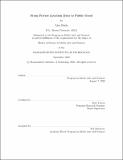From private location data to public good
Author(s)
Berke, Alex(Alexandra A.)
Download1227784207-MIT.pdf (10.66Mb)
Other Contributors
Program in Media Arts and Sciences (Massachusetts Institute of Technology)
Advisor
Kent Larson.
Terms of use
Metadata
Show full item recordAbstract
This thesis was written in the midst of the COVID-19 pandemic as location datasets became crucial sources of information to address the global health emergency. The subject of this thesis is how location data collected from mobile devices can be used to benefit the public and preserve individuals' privacy. The work presented in this thesis directly addresses the public health emergency as well as how these datasets can serve the public beyond the time of crisis. For example this thesis explores privacy-preserving technologies that use data collected from personal devices to scale contact tracing efforts. This is in order to stymie disease transmission as well as stem the adoption of privacy-violating technologies that were initially deployed by governments contending with COVID-19. The work in this thesis also leverages a high-precision and up-to-date location dataset collected from millions of smartphones across the U.S. to better understand the impacts of COVID-19 on communities and human behaviors. This includes developing new metrics to improve the monitoring and modeling of disease transmission. This thesis also explores strategies using machine learning models to generate privacy-preserving synthetic location data that can retain the utility of real location data and supplement traditional survey datasets. Surveys collected by government agencies and research institutions often produce datasets and knowledge that serve as public goods. This thesis frames the ongoing collection of location data as an ongoing population survey. The ethics of data collection are beyond the scope of this work. Instead this thesis shows how location data which primarily benefits private industry can also benefit the public from whom it is sourced, in ways similar to traditional survey data, and protect individuals' privacy.
Description
Thesis: S.M., Massachusetts Institute of Technology, School of Architecture and Planning, Program in Media Arts and Sciences, September, 2020 Cataloged from student-submitted PDF version of thesis. Includes bibliographical references (pages 163-175).
Date issued
2020Department
Program in Media Arts and Sciences (Massachusetts Institute of Technology)Publisher
Massachusetts Institute of Technology
Keywords
Program in Media Arts and Sciences